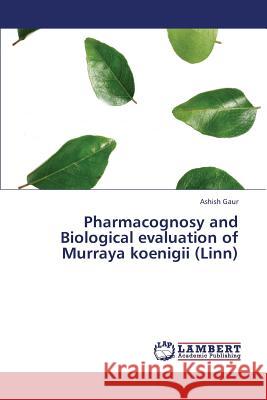Pharmacognosy and Biological evaluation of Murraya koenigii (Linn) » książka
Pharmacognosy and Biological evaluation of Murraya koenigii (Linn)
ISBN-13: 9783659327971 / Angielski / Miękka / 2013 / 100 str.
The leaves of Murraya koenigii (Curry Leaf Tree) are used as traditional medicine for the treatment of diarrhoea. The present study was undertaken to substantiate ethnobotanical claim and evaluate the effect of extract of Murraya koenigii for its antidiarrhoeal potential against experimental model of diarrhoea.The leaves of the plant were studied for their pharmacognostic characteristics like morphology, microscopy, physiochemical parameters and phytochemical screening of various extracts and results were reported. The extracts were obtained after successive extraction with solvents of increasing polarity.The antidiarrhoeal activity of aqueous extract of Murraya koenigii leaves at graded doses (300 & 600 mg/kg body weight) was evaluated in term of reduction in the count of defecation and consistency of faeces using castor oil-induced diarrhoea model in rats. At various doses (300 & 600 mg/kg body weight) the aqueous extract showed a dose-dependent antidiarrhoeal activity evidenced by the reduction in the rate of defecation and consistency of faeces. At the doses of 300 and 600 mg/kg per oral, the aqueous extract showed significant (p
The leaves of Murraya koenigii (Curry Leaf Tree) are used as traditional medicine for the treatment of diarrhoea. The present study was undertaken to substantiate ethnobotanical claim and evaluate the effect of extract of Murraya koenigii for its antidiarrhoeal potential against experimental model of diarrhoea.The leaves of the plant were studied for their pharmacognostic characteristics like morphology, microscopy, physiochemical parameters and phytochemical screening of various extracts and results were reported. The extracts were obtained after successive extraction with solvents of increasing polarity.The antidiarrhoeal activity of aqueous extract of Murraya koenigii leaves at graded doses (300 & 600 mg/kg body weight) was evaluated in term of reduction in the count of defecation and consistency of faeces using castor oil-induced diarrhoea model in rats. At various doses (300 & 600 mg/kg body weight) the aqueous extract showed a dose-dependent antidiarrhoeal activity evidenced by the reduction in the rate of defecation and consistency of faeces. At the doses of 300 and 600 mg/kg per oral, the aqueous extract showed significant (p<0.05) antidiarrhoeal activity in animal model.











